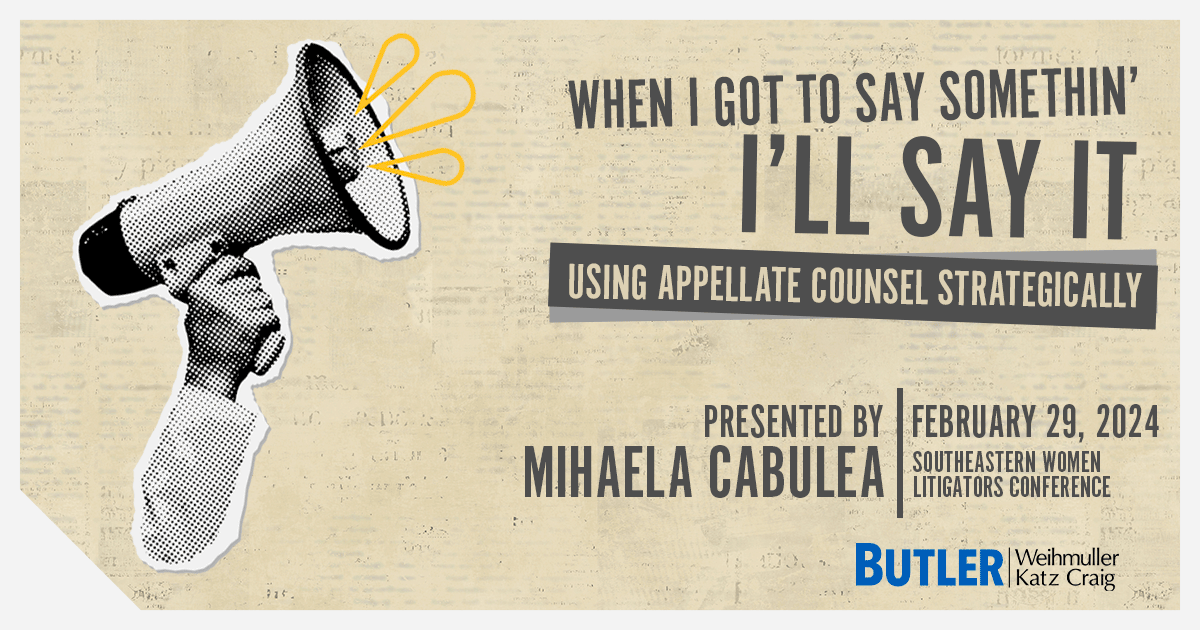
When I Got to Say Somethin’, I’ll Say It: Using Appellate Counsel Strategically
By Mihaela Cabulea | Events
February 27, 2024
Partner | Appellate, First-Party Coverage, Extra-Contractual, Third-Party Coverage
813-281-1900
mcabulea@butler.legal
Overview | Blog Posts | Appellate | Mihaela Cabulea | Related | Print | Share
The Florida Supreme Court in Wheaton v. Wheaton, No. SC17-716, 2019 WL 99109 (Fla. Jan.4, 2019), resolved the district split on the issue whether proposals for settlement made pursuant to section 768.79, Florida Statutes and Florida Rule of Civil Procedure 1.442 must comply with the e-mail service provisions of Florida Rule of Judicial Administration 2.516.
The court quashed the Third District’s decision in Wheaton v. Wheaton, 217 So. 3d 125 (Fla. 3d DCA 2017), and approved the Second DCA’s decision in Boatright v. Philip Morris USA Inc., 218 So. 3d 962, 964 (Fla. 2d DCA 2017), the Fourth DCA’s decision in McCoy v. R.J. Reynolds Tobacco Company, 229 So. 3d 827 (Fla. 4th DCA 2017), and the First DCA’s decision in Oldcastle Southern Group, Inc. v. Railworks Track Systems, Inc., 235 So. 3d 993 (Fla. 1st DCA 2017).
In Wheaton, the appellant served a proposal for settlement by e-mail but neglected to comply with certain requirements for e-mail service set forth in rule 2.516(b)(1)(E)(i)-(v). Wheaton, 217 So. 3d at 126. The trial court ruled that the proposal for settlement could not support an award of attorney’s fees and the Third District affirmed. The Wheaton Court focused its analysis on rule 2.516(b)(1), which specifies that the e-mail service requirement applies to documents that are either “required or permitted to be served upon another.” Id. (citing Fla. R. Jud. Admin. 2.516(b)(1)). Although the Wheaton Court acknowledged that proposals for settlement are not required to be filed upon service and, therefore, are not covered by rule 2.516(a), it nevertheless found that the e-mail service requirement extends to proposals for settlement because they qualify as documents “permitted to be served” under rule 2.516(b)(1). Id. The Wheaton Court, relying on Matte v. Caplan, 140 So. 3d 686, 689-90 (Fla. 4th DCA 2014) and Floyd v. Smith, 160 So. 3d 567, 569 (Fla. 1st DCA 2015), found that e-mail is the exclusive method for service upon a party of any document. Id.
The Florida Supreme Court rejected the Third District’s argument and found that the plain language of section 768.79 and Rule 1.442 does not require service by e-mail. Wheaton, 2019 WL 99109 at *6. The court held that based on the plain language of Florida Rule of Civil Procedure 1.080, Florida Rule of Judicial Administration 2.516 does not apply to proposals for settlement made pursuant to section 768.79 and rule 1.442, because a settlement offer is neither a pleading subsequent to the initial pleading, nor an order, or a document filed with the court. Id.
The Supreme Court explained that the plain language of rule 2.516 does not support the Third District’s conclusion that the e-mail service requirement extends to proposals for settlement because they qualify as documents “permitted to be served” under rule 2.516(b)(1). If rule 2.516 creates two categories of “documents that must be filed – documents that are required to be served and documents that are permitted to be served – proposals for settlement would not fall in the latter group.” Id. That is so because the proposal for settlement statute and rule implementing it, specifically provide that “a proposal for settlement ‘shall be served’ on the party to whom it is made, but ‘shall not be filled,’ unless it is accepted or filing is necessary to enforce the provisions of the statute.” Id. (citing §768.79(3), Fla. Stat. and Fla. R. Civ. P. 1.442(d)). This is mandatory, not permissive language. Thus, contrary to the Third District’s finding, a proposal for settlement does not fall under the ambit of rule 2.516(b)(1). Id. Furthermore, because a proposal for settlement is a document that must be served on the party to whom it is made but not filed with the court, the very language of rule 2.516 excludes proposals for settlement from the categories of documents contemplated by the rule. Id.
In dicta, the court explained that the Fourth District’s decision in Matte v. Caplan, 140 So. 3d 686, 689-90 (Fla. 4th DCA 2014) overlooked the limitation contained in rule 2.516(a) (i.e., “filed in any court proceeding”) and analyzed a motion for sanctions brought pursuant to section 57.105, Florida Statutes, by construing rule 2.516(b). Id. at 7. In doing so, the Matte Court found that the preliminary service of a motion for sanctions must be made by e-mail. Id. at 7. The Supreme Court, however, signaled its disagreement with this position, when it noted that “motions for sanctions are similar to proposals for settlement in that they are forbidden from being initially filed.” Id. (citing § 57.105(4), Fla. Stat. (2018)). The Supreme Court agreed with the Boatright Court that this “constitutes a fatal flaw in that court’s reasoning.” Id. (quoting Boatright, 218 So. 3d at 969).
Conclusion: Although proposals for settlement can be served by e-mail, rule 2.516 does not apply to proposals for settlement and compliance with the e-mail service requirements of that rule is not required. Thus, service can be accomplished by U.S. mail as well.
The Wheaton decision provides grounds to challenge the Matte decision. As the Supreme Court noted, motions for sanctions pursuant to section 57.105, Florida Statutes, are similar to proposals for settlement and are not documents that must be filed with the court upon service. Therefore, rule 2.516 does not apply to sanctions motions brought pursuant to section 57.105, Florida Statutes.
For any further questions, please contact Mihaela Cabulea.

By Mihaela Cabulea | Events
February 27, 2024


By Carol Rooney | News
November 7, 2023

By Mihaela Cabulea | Events, Webinars
September 18, 2023

By Matthew Lavisky | Events
August 16, 2023